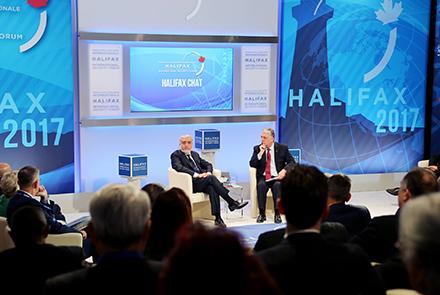National Unity Government (NUG) Chief Executive Abdullah Abdullah on Saturday night addressed the Halifax International Security Forum and discussed the issue of combatting terrorism, destroying their safe havens and establishing peace in the country.
This comes after Abdullah met with high-ranking officials in Washington, including Vice President Mike Pence, US National Security Advisor General HR McMaster, minority leaders and majority Democrats and Republicans in the House of Representatives and Senate, and Deputy US Department of State for Central and South American Affairs.
During his stay in Washington, the chief executive addressed several think tanks and foundations, and met with Afghans residing in the United States and a number of key personalities, a statement issued by the CEO’s office said.
According to the statement the Chief Executive will visit New York after his trip to Canada and will meet with the Secretary-General of the United Nations and the Ambassadors of the United Nations Security Council.
In his discussion at the Halifax Forum, Abdullah said the role of the US in Afghanistan’s war today now has more clarity and more focus following the announcement of President Donald Trump’s new strategy.
Abdullah said at one stage, when the US started focusing on Iraq, the government of Afghanistan had been worried, but it welcomes the new approach – especially as it is conditions-based opposed to timebound.
Abdullah said: “We need to get the job done and at the same time create conditions for talks and peace without setting a timetable.”
He said bringing reforms was a priority for government and that there has been progress in certain areas.
He said elections are being planned for 2018 and although there have been some delays “we need to make up this time” that was lost. He stated presidential elections will take place in 2019.
Speaking to Halifax International Security Forum Senior Advisor Robin Shepherd, Abdullah said that a double game has been “played in our neighborhood” in regards to the fight against terror which attributed to the complications after the Iraq intervention.
“Also the 2014 drawdown of troops impacted the security situation in Afghanistan,” he said.
But he went on to say that the door for talks is open to the Taliban.
He said with regards to the Taliban that his concern was “with their stubbornness so far and their belief that they should come back by force and their connections with terrorist groups in the sanctuaries and safe havens they enjoy outside Afghanistan.”
Asked about Russia’s involvement with the Taliban, Abdullah said he had met with Russian officials on a few occasions and recently one of their security officials visited Afghanistan. He said the perception among them was that Daesh, “especially Daesh in Afghanistan are US made”. He said for Afghanistan this is strange especially as the country, along with its allies “are fighting Daesh days in and out”.
He said Russia “needs to see things the way they are”.
On the issue of Iran, Abdullah said Afghanistan has good relations with Iran and all other neighboring countries and that Afghanistan has made more efforts to improve ties with Pakistan.
He said that there have been reports that are cause for concern that show Iran has contact with Taliban, that in fact it is more than that, but that Afghanistan is working on this.
He did however say that Iran has supported Afghanistan in the past 16 years.
He said: “For Iran, Daesh is the enemy number one and we (Afghanistan) have no argument against that.”
“But we are dealing with Daesh in our countries and we continue to see Daesh as the enemy,” he said adding that NATO is supporting the Afghan forces in the fight against the insurgent groups.
Shepherd asked Abdullah what the status of women in Afghan society was today? In answer to this, Abdullah said a “lot has happened positively. There is no comparison between today and before 2001.”
He said the Taliban had in those years been “treated as sub-humans” and had been deprived of everything.
He said in parts of the country under Taliban control, conditions are still the same for women but outside of that women play an important role in society and government.
“We still have some way to go. We unfortunately still have incidents of violence against women in some parts of the country.”
In relation to this, he said much progress had been made in terms of reforms in the laws.
On the topic of elections, Abdullah said that lessons can be drawn from what happened in 2014 and that one of the most important steps was to ensure a voters list that was “pinned to the polling stations”.
Looking ahead, optimistically, Abdullah said that he believes the country has come a long way from where it was. He said the military has come a long way in defending the country and now government was hoping for foreign investment to improve in the country.

